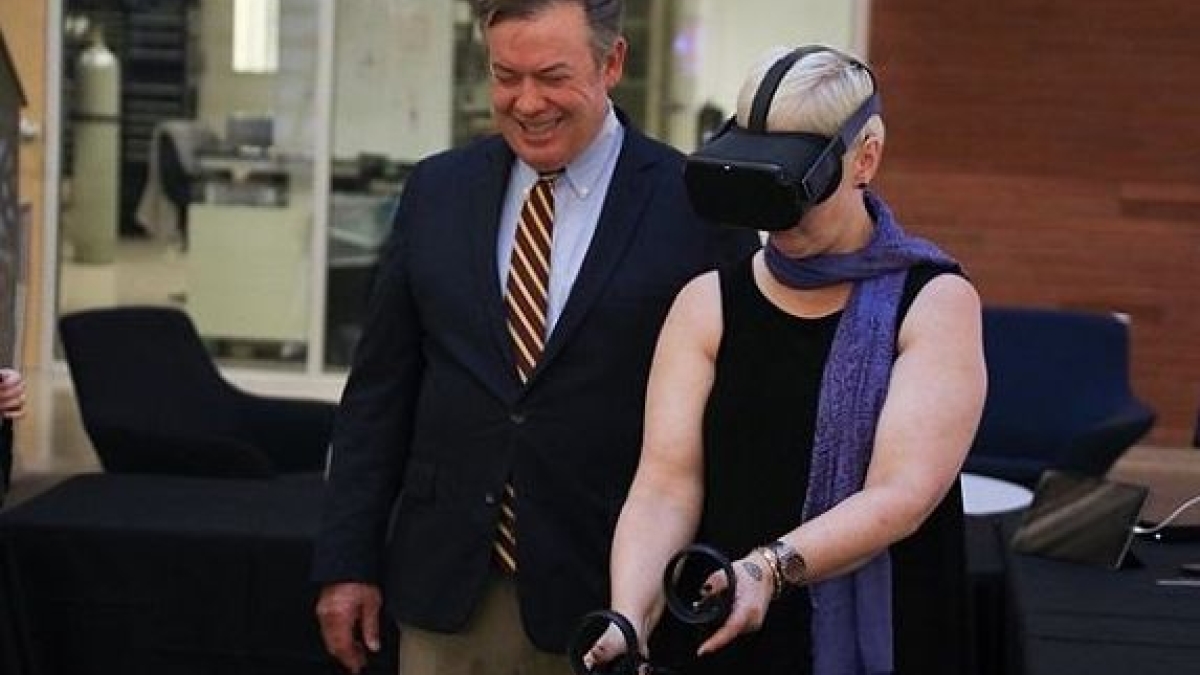ASU professors awarded NSF grant to offer research experience to undergraduates

Research being done in the ASU Meteor Lab, which includes designing computer systems for augmented senses, is one example of the type of research undergraduates will focus on for the project.
Arizona State University School of Arts, Media and Engineering assistant professors Suren Jayasuriya and Robert LiKamWa have been awarded the Research Experiences for Undergraduates (REU) site award from the National Science Foundation. The REU program supports undergraduates around the country who wish to participate in active research in any of the areas of research funded by the National Science Foundation.
Jayasuriya and LiKamWa said their plan is to explore research underlying new emerging forms of visual media, including computational cameras and projectors as well as virtual/augmented/mixed reality systems. Selected students will participate in a 10-week long experience where they will embed themselves into labs of faculty mentors, conduct research and develop skills including preparing demonstrations and presentations, scientific/technical writing and public speaking. There will also be opportunities to present their research in public venues and share demonstrations of their prototypes with the public.
We spoke to Jayasuriya about the grant.
Question: What are your plans for the grant?
Answer: The plan for the grant is to immerse students at the intersection of engineering, computer science and the media arts. We plan to host this REU site every summer for the next three years, and students, after the program is over, will have the opportunity to submit their research to academic conferences or journals. It will also serve to broaden the network of individuals who pursue this interdisciplinary research. Students will be able to engage with the Digital Culture Summer Institute for outreach with middle and high school students, as well as interact with industry members through the SenSIP Center to expand the set of experiences they have while conducting research.
Q: Are there any undergraduates already in collaboration with this?
A: Only informally, through undergraduates in our own research labs or through collaborators, but we hope to recruit the first group of students for summer 2020. We want to attract students at ASU, as well as from across the country, to introduce them to the exciting research that occurs here.
Q: Do you have any research plans in mind for this program?
A: We plan to focus on visual computing research as a broad topic. Some examples include existing research threads going on in our labs. In the Imaging Lyceum, we are pursuing research for non-line-of-sight imaging (seeing around corners), light transport, image-based rendering and physics-based computer vision. Research in Meteor Studio includes designing computer systems for augmented senses in AR/VR/IoT, efficient and performant visual computing systems, and augmented content frameworks. In addition, we have a host of other faculty members across the School of Arts, Media and Engineering and the School of Electrical, Computer and Energy Engineering who will be participating with their research interests to help broaden the vistas for undergraduate researchers who participate in the REU.
More Science and technology

Indigenous geneticists build unprecedented research community at ASU
When Krystal Tsosie (Diné) was an undergraduate at Arizona State University, there were no Indigenous faculty she could look to…

Pioneering professor of cultural evolution pens essays for leading academic journals
When Robert Boyd wrote his 1985 book “Culture and the Evolutionary Process,” cultural evolution was not considered a true…

Lucy's lasting legacy: Donald Johanson reflects on the discovery of a lifetime
Fifty years ago, in the dusty hills of Hadar, Ethiopia, a young paleoanthropologist, Donald Johanson, discovered what would…